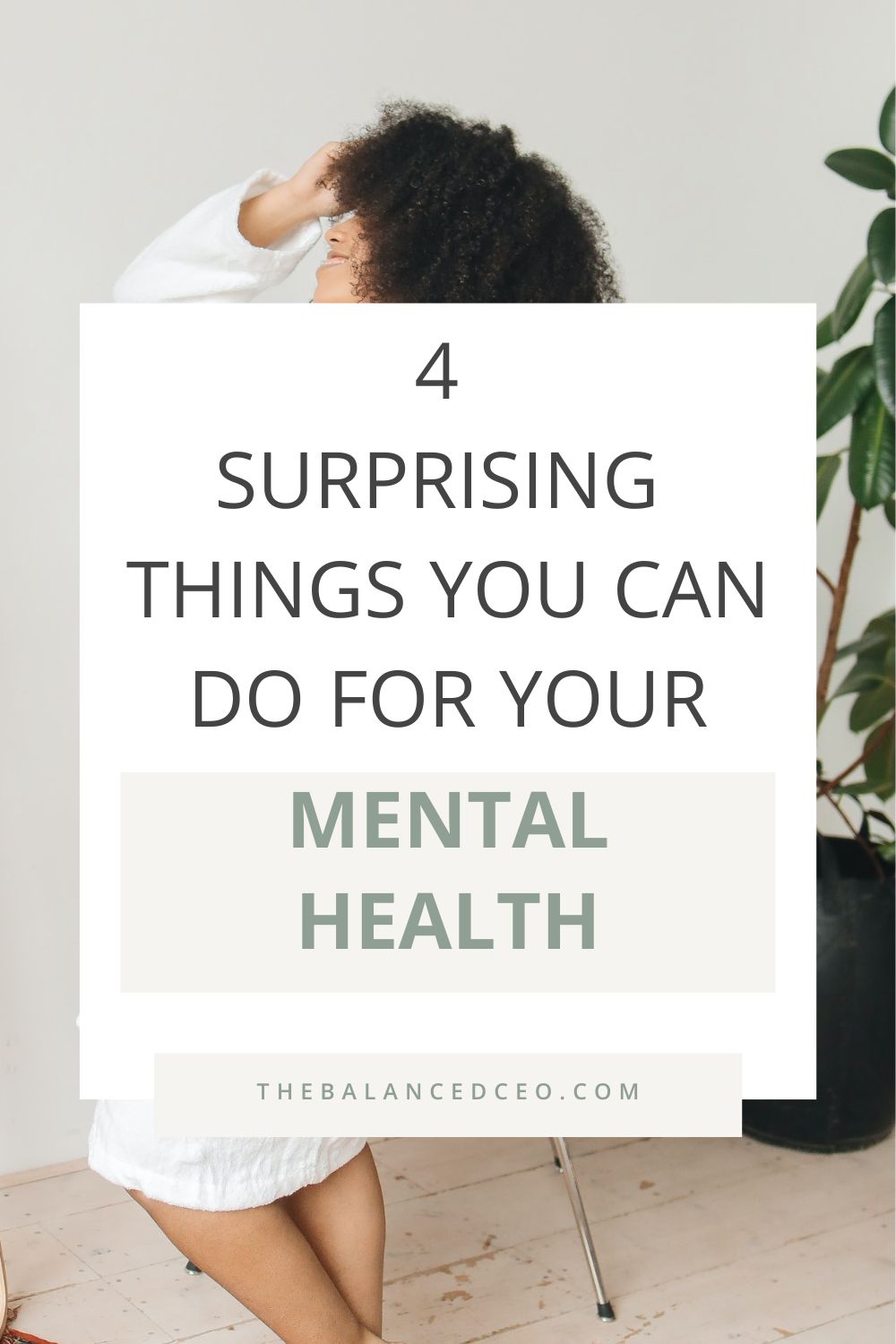This post may contain affiliate links, which means I’ll receive a commission if you purchase through my links, at no extra cost to you. Please read full disclosure for more information.

Eating well, exercising, and expressing gratitude are some popular ways to care for your mental health. However, there are even more activities that can help you maintain your mental well-being. It’s important you seek professional help and get treatment if you notice any ongoing symptoms and mood changes. Let’s get into some lesser-known ways to improve your mental health.
1. Take a Cold Shower
Cold therapy is known to produce feelings of calm and well-being. It can also build mental resilience and help with stress management. Exposure to cold — whether through a cold shower, pool swim or ocean plunge — releases norepinephrine, a neurotransmitter in your brain that affects attention, mood and focus. When the initial shock from the cold has worn down, you may experience a parasympathetic state and may feel more relaxed and rested.
A study in Britain found that a group of 61 people who learned how to swim in cold water for 10 weeks reported improvements in their mood and well-being. Their results were compared to 22 of their loved ones who watched them from the shore.
While you may be hesitant to take a big step and plunge yourself into a cold bath of ice water, you can still practice cold exposure in your home. You can take just two minutes after your regular shower to stand under a cold stream of water and reap the benefits.
2. Dance
In addition to the fun factor, dancing has many benefits, including releasing endorphins that lift your mood and help to alleviate symptoms of depression and anxiety. A conscious dance study shows that 98% of dancers felt that dancing improved their mood. Other research shows that dancing can also reduce cortisol levels.
Other benefits of dancing for your health include:
- Increased self-confidence: Movement can help you to feel connected to your body and more confident in yourself. It’s also a beautiful way to express yourself.
- Better sleep quality: Since it’s a form of exercise, dance will help to improve sleep quality and make you feel more relaxed.
- Improved brain function: Dancing can help you to keep your mind active and healthy. Following choreography or deciding the next move needs memory and quick thinking, all of which can help healthy brain function.
- Improves connectedness to your loved ones: Doing activities like dancing with your partner or an impromptu dance party with your kids will help you to relieve stress and feel closer to your family.
3. Organize or Redecorate Your Space
A well-designed space can create a peaceful environment that makes you and your family feel calm and relaxed. When you come home after a long day, you’ll appreciate a peaceful and tidy home that reduces stress. You can create your own oasis by decreasing clutter, using natural light, and choosing colors that promote happiness.
Natural light exposure is essential for your mental health and physical well-being. When you include natural light in the design of your home or workspace, you are likely to have better sleep and reduced levels of stress.
Color psychology suggests that colors can affect your mood and trigger certain psychological responses. Using colors like white, blush, green and blue can increase feelings of peace and tranquility as well as promote relaxation.
While there are likely other factors affecting your mental health, your living space also has an effect on how you feel. Making the effort to declutter by moving furniture around, giving away old and unused items, or incorporating hidden storage can help you to feel lighter and reduce stress.
4. Try Dopamine Recalibration
You may have seen influencers on social media talking about it dopamine detox and how it increases productivity and makes you happier. At its best, dopamine buzzes at a natural level throughout the day and rises during meal times or exciting activities.
Certain activities, such as constant social media use, emotional eating and gambling, activate the reward pathway and spike your dopamine levels. When this happens constantly, your body begins to produce less dopamine to regulate and keep you at a baseline which can lead to anxiety and depression. When you engage in a specific behavior, it becomes less rewarding — instead, it’s something you need to function normally.
While you cannot actually “detox” yourself from dopamine, you can recalibrate your dopamine pathway to work in its best state. You can do this by identifying the behaviors or activities that you subconsciously turn to when you feel bored or emotional. It could be scrolling on the news or grabbing a cookie when you feel frustrated. After you have identified the habit, take a break.
You may feel low for the first week, but after that you could find that you’re able to focus again. You’ll slow down and enjoy activities that may have made you pull out your cell phone before, like walking to the bus stop or preparing a meal.
The association between the trigger and the dopamine reward will gradually decrease, making it easier for you to use social media in a healthy way again or to have a sweet treat without overindulging.
5. Spent Time with Uplifting People
When you start to surround yourself with people you love, you will not only uplift your own spirits, but you may also be doing others a favor too. Your friend or family member may be struggling silently, and your awareness, time, and attention could be their saving grace.
When you spend a lot of time with someone you can start to pick up on signs that they may need some extra care with regards to their mental health too.
Whether you’re lending a supportive ear and listening to their problems, or you’re seeking out professional Psychiatric Help on their behalf, there is so much you can do to make sure the important people in your life are taken care of. In short, whilst you work on your own mental health, you can also positively impact others in your close circle by helping them too.
Try Something New for Your Mental Health Today
Sometimes what you need is a change of pace or a new activity to help you manage your mental health. Try some of these activities and you will be sure to see some improvement in your well-being.

Ava Roman
Contributor
Ava Roman is a mom, a yogi, and currently a Managing Editor of a women’s lifestyle website. She believes work/life balance is achievable once you learn to set and stick to firm boundaries. You can find more from Ava on her website, Revivalist.





Leave a Reply